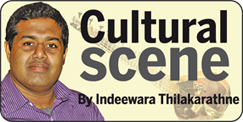|
Galle Literary Festival 2011 :
A vanity fair?
 The scenario developing in and around the world heritage site Galle
Fort and in the city of Galle associated with Galle Literary Festival
reminded me the novel Vanity Fair by William Makepeace Thackeray. The
novel was first published in 1847-48. The scenario developing in and around the world heritage site Galle
Fort and in the city of Galle associated with Galle Literary Festival
reminded me the novel Vanity Fair by William Makepeace Thackeray. The
novel was first published in 1847-48.
It satirises the 19th century British society. Vanity Fair refers to
a never ending fair along the road of pilgrim movement which was held in
the town of Vanity. The town of Vanity symbolises the man’s sinful
desire for worldly things including name and fame. The GLF 2011 marks
the fifth anniversary of the literary festival which have been from its
inception excluded the vast cannon of Sinhalese and Tamil literature and
Sinhalese and Tamil authors.
In the January 30th Edition of The Island, a trilingual writer by the
name of Shyamalee Mahibalan has pointed out that “How did the English
speaking elites of this country simply forget that literature of Sri
Lanka does mean Sinhala as well as Tamil? After all, GLF is a literary
event not an English only literary festival. Or is it our colonialist
mentality that has skewed our judgment? If one attends any literary
festival in a country with vernacular languages, you will be sure to see
literature in native languages showcased. I cannot think of a Canadian
Literary Festival without any French work. Can anyone imagine a
Singaporean Literary festival without any work in Chinese or Malay?
I have raised the question previously whether it is possible to talk
about the literature and drams of Sri Lanka without Prof. Ediriweera
Sarachchandra’s classical play, Maname and his novels including Malagiya
ethho and Malawunge avurududa; Mahagama Sekera’s novel, Thunman Handiya;
Simon Nawaghtthegama’s works; Monica Ruwanpathirane ‘s poetry and
literati representing Tamil literature such as Murugesu Ponnambalam,
Shanmugam Sivalingam and M.A Nuhuman.
However, it should be borne in mind that featuring Sinhalese and
Tamil writers’ work does not mean exclusive session should be conducted
on Sinhalese and Tamil literature in Sinhalese and Tamil media. What is
plausible within the scope of the festival is to conduct sessions on
Sinhalese and Tamil literature in translation. It is a home truth that
most of us enjoyed world literature and great literary works of Russian
and Latin American writers in their English translations.
Politics of literature
A seminal feature of GLF 2011 was the politicisation of literature
and questioning the sovereignty of Sri Lankan Government. Although
politics is part and parcel of public life, perhaps, an inescapable
reality, it is highly undesirable to politicise seemingly a
non-political event.
The Festival commenced with the reports about a group of prominent
literati of boycotting the festival over a tensed political issue. The
move was backed by Noam Chomsky, Arundhati Roy and Ken Loach. Much
published authors such as Noble Laureate, Orhan Pamuk was among the
writers who pulled out from the festival. Later Damon Galgut also joined
the group.
World forum, aftershocks the lingering legacy of Civil War
The most politicised event at the GLF was the BBC’s World Forum,
titled ‘aftershocks, the lingering legacy of Civil War,’ which was held
at Hall de Galle. This free event was described in the brochure as,
“Sunila Abeysekera explores the challenges Sri Lanka continues to face
almost two years after the end of the civil war; Chimamanda Ngozi
Adichie portrays the lasting effects of Nigeria’s 1960’s civil war in
her short story collection, The Thing Around Your Neck; Anjali Watson
looks at post-war Sri Lanka from the perspective of wild animals and
suggests that perhaps war was better for them.”
The very use of terminology to describe the conflict is polemical
given the fact those very terms can be exploited by parties vested with
interest to achieve their ulterior goals. For instance, at the start,
the brochure says ‘two years after the end of the civil war’ and towards
the end it says ‘Anjali Watson looks at post-war Sri Lanka’. Since Sri
Lanka did not wage a major war, the term that should have been always
used is ‘post-conflict Sri Lanka’.
Another important factor that seemed to have been missed out is that
the Southern Province and even the Galle Fort, City of Galle witnessed
the worse civil war in the 1980’s where all the parties to the conflict
were accused of committing extrajudicial executions and human right
violations.
There were parts of the human bodies dumped on the road a few meters
from the venue, Hall de Galle where the BBC world forum was held.
The participation of human rights activists such as Sunila Abeysekara
and the renewed interest that US Embassy in Sri Lanka took in the
festival and US Embassy’s financial and logistical assistance in
transporting academics from the East coinciding with the opening of
American Centre in Jaffna hints out that the Galle Literary Festival
would take a different course, may be literature assuming a subordinate
role.
The GLF 2011 leaves behind many unresolved issues questioning the
very motives of the Festival and its founder. This column will explore
some of the contentious issues in the next couple of weeks.
|

